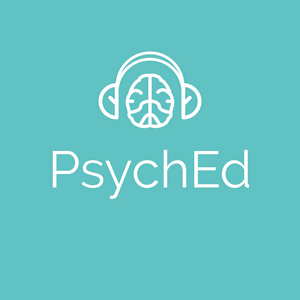Welcome to PsychEd, the psychiatry podcast for medical learners, by medical learners. This short episode covers the basics of electroconvulsive therapy.Hosts: Ravi Bhindi (CC3), Dr. Angad Singh (PGY2)Audio Editing: Dr. Angad Singh (PGY2)Show Notes: Dr. Angad Singh (PGY2)Time Stamps:(0:36) - What is ECT?(2:18) - Indications and efficacy(4:35) - Treatment course(4:32) - Combination treatment(6:33) - Medications to discontinue(8:16) - Contraindications(9:40) - Side effects(11:52) - Procedure(16:03) - SummaryResources:https://www.camh.ca/en/health-info/mental-illness-and-addiction-index/electroconvulsive-therapyhttps://sunnybrook.ca/content/?page=psychiatry-electroconvulsive-therapy-ect-faqReferences:Andrade, C., Arumugham, S. S., & Thirthalli, J. (2016). Adverse Effects of Electroconvulsive Therapy. The Psychiatric clinics of North America, 39(3), 513–530.Brakemeier, E. L., Merkl, A., Wilbertz, G., Quante, A., Regen, F., Bührsch, N., van Hall, F., Kischkel, E., Danker-Hopfe, H., Anghelescu, I., Heuser, I., Kathmann, N., & Bajbouj, M. (2014). Cognitive-behavioral therapy as continuation treatment to sustain response after electroconvulsive therapy in depression: a randomized controlled trial. Biological psychiatry, 76(3), 194–202.Espinoza, R. T., & Kellner, C. H. (2022). Electroconvulsive therapy. New England Journal of Medicine, 386(7), 667-672.Gill, S., Hussain, S., Purushothaman, S., Sarma, S., Weiss, A., Chamoli, S., ... & Loo, C. K. (2023). Prescribing electroconvulsive therapy for depression: Not as simple as it used to be. Australian & New Zealand Journal of Psychiatry, 57(9), 1202-1207.Janjua, A. U., Dhingra, A. L., Greenberg, R., & McDonald, W. M. (2020). The efficacy and safety of concomitant psychotropic medication and electroconvulsive therapy (ECT). CNS Drugs, 34(5), 509-520.Jelovac, A., Kolshus, E., & McLoughlin, D. M. (2013). Relapse following successful electroconvulsive therapy for major depression: a meta-analysis. Neuropsychopharmacology : official publication of the American College of Neuropsychopharmacology, 38(12), 2467–2474.Kolshus, E., Jelovac, A., & McLoughlin, D. M. (2017). Bitemporal v. high-dose right unilateral electroconvulsive therapy for depression: a systematic review and meta-analysis of randomized controlled trials. Psychological Medicine, 47(3), 518-530.Lam, R. W., Kennedy, S. H., Adams, C., Bahji, A., Beaulieu, S., Bhat, V., ... & Milev, R. V. (2024). Canadian Network for Mood and Anxiety Treatments (CANMAT) 2023 Update on Clinical Guidelines for Management of Major Depressive Disorder in Adults: Réseau canadien pour les traitements de l'humeur et de l'anxiété (CANMAT) 2023: Mise à jour des lignes directrices cliniques pour la prise en charge du trouble dépressif majeur chez les adultes. The Canadian Journal of Psychiatry, 69(9), 641-687.Luchini, F., Medda, P., Mariani, M. G., Mauri, M., Toni, C., & Perugi, G. (2015). Electroconvulsive therapy in catatonic patients: Efficacy and predictors of response. World journal of psychiatry, 5(2), 182–192.Tess, A. V., & Smetana, G. W. (2009). Medical evaluation of patients undergoing electroconvulsive therapy. New England Journal of Medicine, 360(14), 1437-1444.Zolezzi M. (2016). Medication management during electroconvulsant therapy. Neuropsychiatric disease and treatment, 12, 931–939.For more PsychEd, follow us on Instagram (@psyched.podcast), Facebook (PsychEd Podcast), X (@psychedpodcast), and Bluesky (@psychedpodcast.bsky.social). You can email us at
[email protected] and visit our website at psychedpodcast.org.


